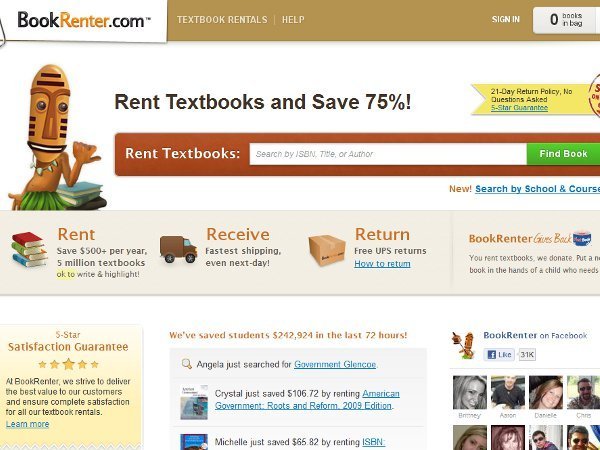
If college students were avoiding Kindle textbooks before because they couldn’t take notes or highlight or enjoy the thrill of lugging around a stack of books across campus every day, now they simply have no excuse. Amazon on Monday announced its new Kindle textbook rental program, which allows students to save as much as 80% on the normal retail price of a textbook, while saving their notes in the Amazon cloud so that they can retrieve them at any point after “returning” a Kindle textbook.
Textbook rental prices vary depending on how long you want to rent a title, with the minimum rental period being 30 days. For example, the typical retail price for “Organic Chemistry” is $123.50. You can buy the book on Amazon for $98, or you can rent it for 30 days for $42—a savings of 66%. This is nice for those situations when you have to buy a book because your instructor plans to have you read one chapter in the 11th week of the semester. But let’s say you need the book for a longer period of time. You can rent it for 60 days (half a semester) for $53, or you can get it for the entire four-month semester for $67.
For those who like to shoot down technological innovation because they’re afraid of change, the Kindle textbook rental program offers all the same amenities of a physical textbook, minus the forearm-crushing weight of hauling it around town, and the potential for paper-cuts. You can’t lose! But to be more specific, what about note-taking? Everyone knows you can take notes on Kindle books now—as well as highlight and bookmark, but if you have to “return” the book, wouldn’t that make note-taking obsolete?
Amazon is upping in the ante in the booming textbook rental industry by allowing users to store their notes via the Amazon cloud so that they can retrieve them after the rental period expires. This is great for those situations where you have to buy a book to read one or two chapters over the course of the semester, but need your notes for the final exam. It’s also a better deal than physically buying a textbook, which most students sell back to the campus bookstore at the end of the semester—thereby losing all their notes and highlights. The same goes for physically renting a textbook, which could give Chegg and Bookrenter a run for their money.
Additionally, students don’t have to have a Kindle to rent Kindle textbooks. The program also works via Kindle reading apps for smartphones, tablets, PCs, or Macs.



















